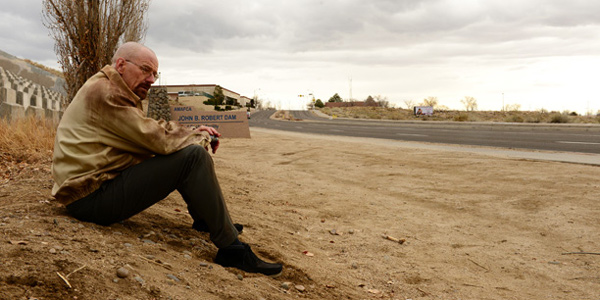Why Breaking Bad's 'Granite State' Was A Necessary Deep Breath Before The Finale

Your Daily Blend of Entertainment News
You are now subscribed
Your newsletter sign-up was successful
Especially after the gun battles, knife fights and endless heartbreak of last week's "Ozymandias," tonight's penultimate episode of Breaking Bad, titled "Granite State," felt about as slow and quiet as a stroll down a snowy New Hampshire road. Promises that each of the final two episodes of Breaking Bad would be expanded to 75 minutes seemed to guarantee that the series would ramp up to an even more explosive finale, just the way that the final four episode of Season 4 were a relentless push to the final conflict between Walt and Gus Fring.
But let's be honest… we needed this episode. A chance to catch our breath and stop fearing death and disaster in every single scene, "Granite State" was slow-paced but necessary table-setting to get us to the series finale. We've known since the start of Season 5 way back last summer that we would eventually find Walt back in Albuquerque with a New Hampshire driver's license, and the question of how he gets there has lingered over the entire season. But even seeing Walt hop into the red van of life-transformation at the end of "Ozymandias" wasn't enough to explain Walt's transformation into Mr. Lambert, and his surely suicidal decision to return to Albuquerque and his abandoned home. Yes, "Granite State" could have kicked off at that Denny's and we could have put the pieces together of how Walt was handed a fresh start and abandoned it to seek vengeance. But that's not how Breaking Bad works.
As we were reminded by that clip of Walt from the pilot in the promo for next week's finale, both chemistry and Breaking Bad are the study of change. We have seen every single one of Walter White's transformations to this point-- no skipping allowed, even when we'd give anything to get away from him. The things that inspire Walt to abandon New Hampshire and head back to Albuquerque are the same motivations we've seen from him all along-- a desire to get money to his family and now to prove to Walt Jr. he isn't a monster, and lingering envy toward Gretchen and Elliott that's only exacerbated by that Charlie Rose interview. Just because it confirms what we've all been guessing about what brings Walt back to Albuquerque-- pretty much everyone had the money pegged for his main motivation-- doesn't mean we can glide right over it. Breaking Bad is a show about process, both in meth empire-building and the complicated, internal decisions that drive these characters.
Loose threads that couldn't find room in last week's tense "Ozymandias" were wrapped up here, from Todd's reasons for continuing to cook meth (oh, Lydia) to Saul's fate (there are several Cinnabon locations in Omaha) to how the White family fares after Walt exonerates them (not that great, it turns out). More importantly, the state of these characters, recovering from last week's mayhem even more than we are, was solidified of what ought to be an action-heavy finale. Jesse, though despondent and heartbroken in Todd's prison, hasn't given up hope, and likely won't so long as Brock is still alive (RIP Andrea). Skyler is keeping quiet and trying to live normal life, but she's still in danger from Todd and the Nazis. Walt Jr., the scales finally lifted from his eyes, is actively hoping for his father's death. And Walt, his health rapidly deteriorating, has rejected a quiet and sad end for a dramatic one, yet another selfish move in a long, long string of them that led to this dark point.
With two episodes left to go, dozens of things seemed possible for the end of Breaking Bad-- an extended subplot about Huell's escape from that motel, frequent check-ins with Marie and her grieving, a backdoor pilot for Better Call Saul, anything. Now that "Granite State" has spent the time to set up the pieces, the conclusion seems clear. Walt returns to Albuquerque to go after Jack and the Nazis, not for Jesse (as I'd hoped), but for his money. The series will end with Walt and Jesse in the same place again, and nothing in "Granite State" indicated that ending will be any darker than we all expected. But rather than just propulsively sending the story forward, "Granite State" gave us vital time to check in with these characters, one more step in this "study of change" before it reaches its bloody conclusion.
Your Daily Blend of Entertainment News
Staff Writer at CinemaBlend

